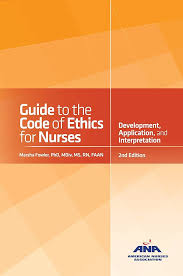A few Nursing books
Below is a list of some of the most popular nursing books.
| Author | Title |
| Lippincott | |
| Potter and Perry’s |
Ethics Took Kit for Nurses
Below is a link to a full-text copy of the e-book listed below - please notice that only one user can use the book at a time - if the resource is busy - wait a few minutes and try back! Click the .pdf to download!
The Guide to the Code of Ethics for Nurses

Synthesized Evidence Based Resources
Follow the Direct Link for direct access to each of the database's synthesized resources.
| Databases | What you will find | Direct Link To: | Description |
| CINAHL Ultimate | Articles Books Evidence-Based CareSheets Journals |
| Cumulative Index to Nursing and Allied Health is considered to be the world's most comprehensive nursing and allied health research database |
| ClinicalKey Nursing | Articles Books Clinical Summaries Evidence-Based Monographs Guidelines
| Clinical Summaries | Clinical Key Nursing is an online resource containing evidence-based information covering nearly every nursing specialty. |
| Dynamic Health | Clinical Summaries Nursing Skills | Care Interventions | Dynamic Health is designed to provide fast, accurate, and actionable answers to questions as they arise at the point of care |
| Johanna Briggs Institute (JBI) | Best Practice Sheets Evidence Summaries
| (Look for the search box) | JBI provides the best available evidence to support clinical decisions |
If we can not locate synthesized evidence relevant to our topic, we will need to search for unfiltered evidence using the PICO Tool to refine the practice question.
Refine your PICO question:
P - Patient/Population: Who are you interested in (e.g., diabetic patients, post-operative patients)?
I - Intervention: What specific treatment or approach are you considering (e.g., pain management technique, educational intervention)?
C - Comparison: Is there an alternative intervention you want to compare it to (e.g., standard pain medication vs. a new technique)? This might not be applicable in all cases.
O - Outcome: What are you hoping to achieve (e.g., reduced pain scores, improved patient satisfaction)?
Step 2. Visit the SMH Medical Library and conduct a literature search -
SMH Medical Library Digital Library - use the search terms relevant to your topic that coincide with your PICO question.
Narrow down the search by using terms that will pull EBP articles such as:
| Evidence-based practice, ebp, or best practice | Quality Improvement, Quality of care |
| Guidelines, protocols, practice guidelines, clinical practice guideline | Meta-analysis, systematic review, literature review, overview |
| Nurse, Nurses, Nursing | Treatment outcome, Therapeutic use, Hospital Setting (or specify ie. ICU, Peds, etc) |
When Searching, use a combination of the search fields to create your search:
| AU Author | use for Author search |
| AB Abstract | use to discern specific terms like "ERAS" etc. |
| TX All Text | use for large range search |
| TI Title | use to narrow down the topic by selecting words found in the title |
| SO-Journal | use if searching known journals ie. AORN |
| SU-Subject | use for topic of search ie. Surgical site infection |
Use filters to narrow down or sort the search:
| Scholarly Journal | Check to limit to Peer Review |
| Pub Date | Limit to date range |
| Source Types | Limit to Academic Journals |
| Publication | Limit to journal subset |
| Geography | Limit to location (USA, Europe) |
| Databases | Limit to Medline or CINAHL |
![]() Sign in to EBSCO to save your articles in a folder - click the folder to add an article.
Sign in to EBSCO to save your articles in a folder - click the folder to add an article.
